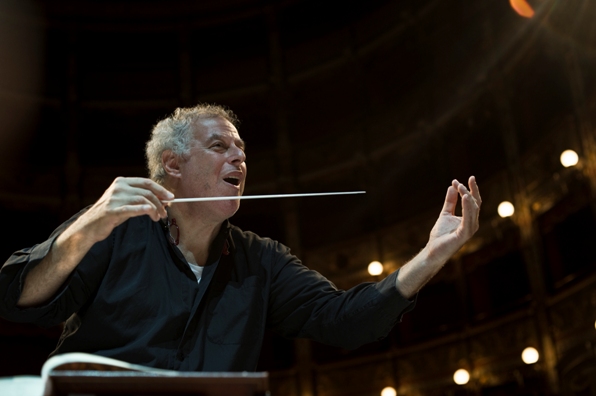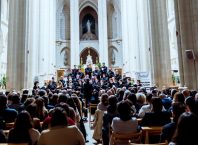
There has been an excited buzz among Israeli opera lovers lately, in anticipation of three events: Giuseppe Verdi’s bicentennial, the country’s first performance of his opera Luisa Miller, and a visit from one of Israel’s most beloved musicians, conductor Daniel Oren. One hour before the curtain rises on a Friday matinee performance, Maestro Oren is preparing to enter the orchestra pit and conduct before what appears will be yet another full house. He graciously makes the time to chat with me about the opera, its composer, and the artists who recreate it for us today.
Israel’s premiere of Luisa Miller
Oren describes Luisa Miller as “a jewel of an opera”. Audiences have been swept away by the Israel Opera’s excellent production, and the Maestro credits the Israel Opera’s general director, Hanna Munitz, for this success. Munitz chose this lesser known composition to begin the Verdi bicentennial celebrations, and not a popular one such as Aida or Rigoletto – and despite the opera’s relative anonymity, the opera house has seen few empty seats these past few weeks. This accomplishment, Oren says, is thanks to Munitz and to Michael Ajzenstadt, the Opera’s artistic director, and to the staff of the Israel Opera, who work in harmony and strive to bring the best production they can to the public, despite the many difficulties and accidents involved. Moreover, Maestro Oren appreciates the intelligent and responsive audiences in Israel, and feels that they believe in him and in the opera company.
The Maestro and his art
After winning the Herbert von Karajan award in 1975, Oren’s career flourished and he has been conducting opera since the very beginning of his career. He laments that one of the difficulties in the music world today is that fewer people are going into the business. “As a boy growing up in Tel Aviv, I would hear a cello playing from one apartment, a viola or a flute from another. Today people turn to other things. Man needs food, but must also have food for the spirit, and music is the greatest form of it.”
“I thank God and I thank my parents for the opportunity to study music,” says Oren. “My parents worked very hard and sacrificed much in order to pay for my studies, and always insisted that I study with the best teachers.” He remembers his first day as a student in Berlin, when, while traveling on the train, he realized he was being followed by a sinister-looking man. “I kept walking and every time I looked back, there he was,” he recalls. The very same day his father bought him a car. Oren’s mother came from a religious Polish family, and his paternal grandfather was a well-respected Arab businessman in Israel, and a Zionist. (He bought Oren his first violoncello). All the family funds went to help Oren fulfill his destiny.
An impressive lineup of singers
Several of the divas and divos we have been enjoying in this Luisa Miller were hand-picked by Oren himself. After thirty-two years as a conductor, he’s got a good eye – and ear – for singers. Most of all, though, he loves the music and cares about the singing – and he likes the singers themselves, who are the heart of opera. Furthermore, he wants to bring the best singers in the world to perform here, for the Israeli audience.
And what wonderful singers they are. The jewel in the production’s crown is Leah Crocetto, one of Maestro Oren’s recent discoveries, who brought the house down in the title role – which is especially hard to sing because it combines the agility of the bel canto style and the more Verdian lyrical style, which requires more volume. Maestro Oren describes her voice as “a voice of the past”, and predicts that she will be one of the most important singers in the near future. She easily handles all registers, maintaining rounded notes even in the top registers.
The cast also features several basses and bass-baritones of truly colossal talent: Carlo Striuli and Carlo Cigni as Wurm and Roberto Scandiuzzi as Walter. Listening to a good basso, Oren says, like listening to a violoncello singing. Two excellent baritones, Ionut Pascu and Vitaliy Bilyy, grace the cast list as Miller, and tenor Massimiliano Pisapia delivers a wonderful Rodolfo.
The Israel Opera – a home away from home
It should be noted that it has been especially tricky to bring star artists to Israel this time, with the difficult state of affairs in the region and a bus attack meters away from the opera house still fresh in our memories. Still, says Oren, singers from abroad come to Israel to perform despite the sometimes alarming news headlines, and some of this production’s soloists already feel quite at home here: Roberto Scandiuzzi, who sings Walter, has sung in Israel in La Juive and in Norma, and Carlo Striuli, singing the role of Wurm, is familiar to Israeli audiences after dozens of performances at the opera house and at Masada. Striuli, an immensely talented singer, would come to Israel even under the threat of bombs, says Oren. Singers visiting Israel for the first time find themselves enjoying the pleasant and professional atmosphere at the Israel Opera, and the “menschlichkeit” Munitz has created here is priceless and rare.
Oren’s respect for the Opera’s directors is infinite. “Hanna Munitz is THE manager, the best general director the opera has ever had, and there will never be another like her. She created the Israel Opera.” The numbers speak for themselves: if, in a country of seven and a half million people, each performance of the opera is sold out, the company must be doing something right.
Verdi’s developing musical approach
In Luisa Miller you will hear a Verdi who is rapidly creating the operatic style that will make him one of the most famous men in Italy. He learned from the composers he admired, adopting for example the bel canto style, as heard in the first act of Luisa Miller. From there he began to make his own way, evolving into the Verdi we know, and in Luisa Miller‘s second and third acts one can hear his own style emerging. It may not be the Verdi of Don Carlo, Otello, or Falstaff, but it is a work of genius nonetheless.
In conducting Luisa Miller, Oren tries to express Act I’s bel canto parts and also highlight Verdi’s wonderful melodies, which are actually very traditional. The opera is abundant with cabalettas because it was commissioned by the Teatro San Carlo, in Naples. The Neapolitans loved a good cabaletta, and Verdi and Cammarano created the entire opera with the local public in mind.
Where text and music meet
Since opera is an art form that combines beautiful words and beautiful music, language is a crucial aspect of singing, and Maestro Oren feels that without proficiency in the language being sung, a singer cannot properly perform his part. You must be able to understand what you’re saying, and singing, no matter your nationality or background. (The Maestro’s words remind me of my long-neglected vow to improve my Italian; I remain sheepishly silent and make a mental note to sign up for a course.)
I ask the Maestro about how the orchestration of the work helps paint the characters of the story. Composers have long used certain instruments to depict their characters, he says, creating a sort of theme. Verdi uses the clarinet to characterize Luisa, for instance in Act II’s letter-writing scene, and it is also noticeable in the overture, where it is interwoven as an independent voice. The clarinet is a lyrical instrument, he explains, and might be used to express a wide spectrum of emotions, such as tenderness and love. It has often been chosen to accompany characters of a gentle nature. Later, in Rigoletto, Verdi will use the oboe to embellish, for example, Gilda’s sorrowful confession in Act II (“Tutte le feste in tempio”).
Oren believes that the Verdi’s “formula” for opera is the greatest there is. He especially admires the composer’s skill with concertati, the ensemble pieces heard for instance at the end of Act I and at the opera’s finale. Oren has noticed that the audience in Israel is very moved by these ensembles, and reports that the Act III concertato drew tears from several listeners. A concertato can be three voices or even six or seven voices, plus a chorus who speak their mind along with the main characters. Thus the audience can hear the emotions and thoughts of each character and their feelings toward the other characters. The orchestra uses its own voices to highlight what is being said and sung; in the closing concertato of Luisa Miller, for instance, Luisa’s dying moments are accompanied by the harp, an instrument which has for centuries been used to symbolize heaven. Here it turns Luisa into an angel as she breathes her last. The harp actually remains silent for the duration of the opera, coming in only at the end to serve exactly this purpose.
All these voices, blending together in perfect harmony, are woven into a many-fibered cloth of plot, text and music. This season at the Israel Opera is not only celebrating the Verdi bicentennial, but also focusing on operas based on great works of world literature, and I will try to remember Maestro Oren’s words as the season continues.
“Steal!”
Does Oren have any advice for aspiring musicians? Certainly. One thing performers don’t do enough of these days is imitate those who have sung before. Composers have been copying and “stealing” from one another for centuries. Like many of his contemporaries, Verdi was influenced by the enormously popular composer Giacomo Meyerbeer (L’Africaine, Robert le Diable), and Oren believes that today’s musicians must, like the young Verdi, study the work of their predecessors. “Steal,” Maestro Oren bids the singers of today. “Imitate and learn from the great artists of the past.” I heartily agree; and wasn’t it Verdi himself who once wrote to a friend, “Return to the past and there will be progress”?





